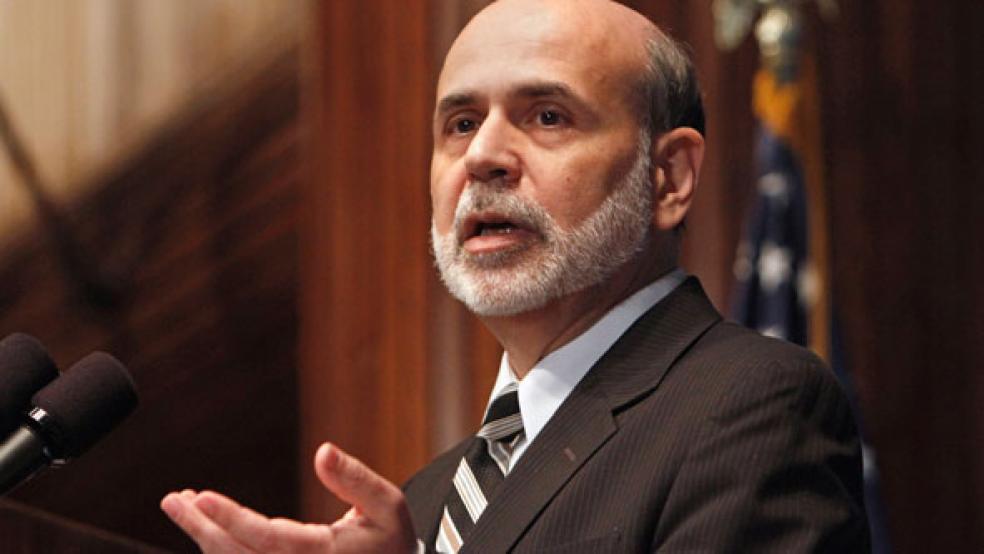A political showdown over raising the national debt ceiling that drags on for any length of time could have “catastrophic” consequences for the U.S. economy, Federal Reserve Board chairman Ben Bernanke warned Thursday, even as he encouraged Congress to move quickly to adopt a long-term plan to bring the nation’s huge budget deficits under control.
The Fed chief, making a rare press briefing, urged congressional leaders “not to focus on the debt limit as a bargaining chip” but to focus on the fiscal issues to address this situation. GOP leaders are insisting that any increase in the debt ceiling be linked to substantial cuts in domestic spending, while some Tea Party advocates say they will oppose any increase in the debt limit.
“We must be very careful that we don’t leave any impression that the U.S. will not pay its creditors,” Bernanke told a packed house at the National Press Club.
With the federal budget deficit projected to rise to $1.5 trillion this year, the statutory debt ceiling of $14.3 trillion will be exceeded sometime in late spring, according to the latest Treasury Department estimates. The tax relief package passed in late December, which included a two-year extension of the Bush administration’s income tax cuts as well as an across-the-board two percentage point cut in payroll taxes, added an additional $400 billion to the fiscal 2011 deficit.
But it also contributed to the modestly upbeat forecast for this year’s economy that Bernanke offered today. He said that fiscal stimulus, coupled with the Fed’s policy of buying Treasury bonds to keep interest rates low – so-called quantitative easy -- should encourage enough economic growth to finally begin reducing unemployment which is at 9.4 percent. January’s numbers are due out Friday.
“There is some good news,” he said, citing today’s initial jobless claims which fell by 42,000 last week to a seasonally adjusted 415,000. “Employers are becoming more willing to hire. We’ll see lower unemployment rates soon.”
However, he cautioned it will take several years of robust economic growth before the economy returns to anywhere near full employment, which will have devastating consequences for millions of Americans. “Half of the unemployed have been that way for six months or more,” he said. “If they find work, it may be a much reduced wage or part-time. They lose skills. They lose knowledge about what is happening in their line of work.” The consequences of this recession, he said, “will last a long time.”
Bernanke’s monetary policy has come under fire from some economists and from critics on Capitol Hill. They claim quantitative easing will inevitably lead to rapid inflation. Bernanke acknowledged that as a theoretical possibility, but focused attention on the actual inflation rate, which remains subdued. In fact, inflation is running at 1.2 percent, which is a full percentage point below European inflation.
Bernanke’s European counterpart, Jean-Claude Trichet, announced Thursday the European Central Bank would hold interest rates steady at a record low 1 percent. While expressing some concern about rising oil and food prices, “this has not so far affected our assessment that price developments will remain in line with price stability over the policy-relevant horizon,” Trichet said.
Bernanke dismissed concerns that rising food and oil prices were related to monetary policy. Unrest in the Middle East, adverse weather conditions and increased food demand in fast-growing developing economies like China and India were driving price increases in those commodities, which are not part of the core inflation index, he said.
“On the whole it’s a very positive development,” he said. “Millions of people in poverty are moving closer and closer to a middle class standard of living. . . Some emerging markets are facing inflationary pressures because their own economies are growing faster than capacity.”
Asked if the U.S. risked becoming another Greece or Ireland because of its failure to address the budget deficit, Bernanke said the improving bond and stock markets suggested otherwise. “The markets seem to be behaving like these problems will be addressed,” he said. “This is a very wealthy productive economy. There is no sense that we are economically unable to find solutions to these problems.”
However, summoning the political will to get the job done was a separate question, he said, and that eventually would affect markets if left unaddressed. “The question is whether we have the political capacity to do it,” he said. “A number of members of House and Senate have talked for years” about solutions to the nation’s chronic deficits, and there is “considerable interest in the general public.
“There is only so far we can kick the can down the road,” he said. “The sooner we address this the better it will be for our economy.”
Related Links:
Fed’s Bernanke Shrugs off Inflation Concerns (Wall Street Journal)
Bernanke’s Victory? Chairman Speaks More of Deficit than QE2 (Forbes)



